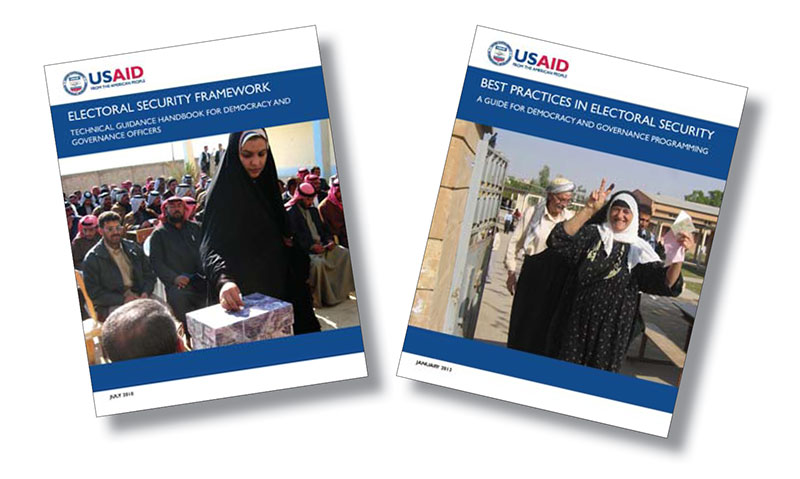[vc_row][vc_column width=”1/1″][vc_column_text]
ELECTORAL SECURITY:
Addressing Electoral Conflict
[/vc_column_text][/vc_column][/vc_row][vc_row][vc_column width=”2/3″][vc_column_text]Over the last two years in what has been termed the “Arab Spring,” the collapse of long-standing regimes in countries such as Tunisia, Egypt, and Libya has created space for political contestation that citizens in these countries had never before experienced.
Having demonstrated their strength through actions on the street, the citizens of the Arab Spring looked to electoral processes as crucial to legitimizing government, promoting accountability and good governance, as well as contributing to national stability. While elections can serve these needs if administered impartially and in a peaceful environment, they can also de-stabilize nations and de-legitimize governments if mired in conflict and violence. What is more, the potential for violence can keep citizens away from the polls and deter candidates from openly campaigning. Recent events in Libya and other countries evidence that, despite forward progress and remarkable gains across the Arab world, these processes and ongoing transitions remain fragile. This has particular implications for other countries in the Middle East and North Africa (MENA) region slated to hold elections in the coming months—should upcoming polls experience conflict and violence, transitions risk being de-railed, and the legitimacy of governments questioned.

Recognizing the threat that violence poses to the integrity of elections, over the past year Creative has been working with state- and non-state stakeholders across the globe to develop strategies to prevent, manage, and mediate election-related conflict and violence. Through a program funded by USAID to help state- and non-state actors in these locations manage potential conflict surrounding upcoming elections, Creative’s Jeff Fischer and Patrick W. Quirk performed electoral security assessments in Afghanistan, Burundi, Guatemala, and the Philippines. In doing so, they used the Electoral Security Framework – Technical Guidance Handbook for Democracy and Governance Officers (Framework), which Creative developed for USAID.
Building on findings from these assessments and extensive interviews with experts across the globe, in January USAID published the Best Practices Guide in Electoral Security – A Guide for Democracy and Governance Programming (Guide). The Guide provides USAID’s development professionals, as well as electoral assistance and conflict prevention policy-makers and practitioners, with a global overview of best practices in programming they may use to devise interventions to prevent, manage, or mediate electoral conflict and violence. Within the context of electoral security, the Guide defines a “best practice” as a policy, practice, or program intervention that has demonstrated measurable results in achieving electoral conflict prevention, management, or mediation. The Guide presents best practices as organized by: 1) electoral phase; 2) thematic area; and 3) policy, practice, or program activity by state and non-state stakeholder.
The Guide is the companion volume to the Framework, which describes an assessment methodology to develop a profile of potential threats to electoral processes so that donors and partner governments can develop programmatic responses to prevent, manage, or mediate such threats. In its work, Creative has used the Framework to perform electoral security assessments in Afghanistan, Bangladesh, Burundi, Colombia, Guatemala, Haiti, the Philippines, Zambia, and Zimbabwe.
The Framework and Guide are tools that actors in the MENA region and beyond can apply to devise strategies and interventions to prevent, manage, and mediate violence and conflict surrounding upcoming polls and thereby help ensure citizens have the opportunity to express their opinion and tangibly impact their society’s future.
— Patrick W. Quirk, Conflict Management and Mitigation
 [/vc_column_text][/vc_column][vc_column width=”1/12″][/vc_column][vc_column width=”1/4″][vc_widget_sidebar sidebar_id=”sidebar-primary”][/vc_column][/vc_row]
[/vc_column_text][/vc_column][vc_column width=”1/12″][/vc_column][vc_column width=”1/4″][vc_widget_sidebar sidebar_id=”sidebar-primary”][/vc_column][/vc_row]